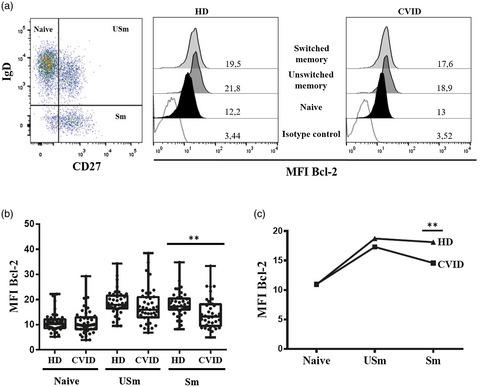当前位置:
X-MOL 学术
›
Clin. Exp. Immunol.
›
论文详情
Our official English website, www.x-mol.net, welcomes your feedback! (Note: you will need to create a separate account there.)
Defective Bcl‐2 expression in memory B cells from common variable immunodeficiency patients
Clinical & Experimental Immunology ( IF 4.6 ) Pub Date : 2020-09-22 , DOI: 10.1111/cei.13522 L Del Pino Molina 1 , J M Torres Canizales 1 , O Pernía 2 , R Rodríguez Pena 1 , I Ibanez de Caceres 2 , E López Granados 1
Clinical & Experimental Immunology ( IF 4.6 ) Pub Date : 2020-09-22 , DOI: 10.1111/cei.13522 L Del Pino Molina 1 , J M Torres Canizales 1 , O Pernía 2 , R Rodríguez Pena 1 , I Ibanez de Caceres 2 , E López Granados 1
Affiliation

|
Common variable immunodeficiency (CVID) is a primary immunodeficiency characterized by hypogammaglobulinemia and different degrees of B cell compartment alteration. Memory B cell differentiation requires the orchestrated activation of several intracellular signaling pathways that lead to the activation of a number of factors, such as nuclear factor kappa B (NF‐κB) which, in turn, promote transcriptional programs required for long‐term survival. The aim of this study was to determine if disrupted B cell differentiation, survival and activation in B cells in CVID patients could be related to defects in intracellular signaling pathways. For this purpose, we selected intracellular readouts that reflected the strength of homeostatic signaling pathways in resting cells, as the protein expression levels of the Bcl‐2 family which transcription is promoted by NF‐κB. We found reduced Bcl‐2 protein levels in memory B cells from CVID patients. We further explored the possible alteration of this crucial prosurvival signaling pathway in CVID patients by analysing the expression levels of mRNAs from anti‐apoptotic proteins in naive B cells, mimicking T cell‐dependent activation in vitro with CD40L and interleukin (IL)‐21. BCL‐XL mRNA levels were decreased, together with reduced levels of AICDA, after naive B‐cell activation in CVID patients. The data suggested a molecular mechanism for this tendency towards apoptosis in B cells from CVID patients. Lower Bcl‐2 protein levels in memory B cells could compromise their long‐term survival, and a possible less activity of NF‐κB in naive B cells, may condition an inabilityto increase BCL‐XL mRNA levels, thus not promoting survival in the germinal centers.
中文翻译:

常见可变免疫缺陷患者的记忆 B 细胞中 Bcl-2 表达缺陷
常见可变性免疫缺陷 (CVID) 是一种原发性免疫缺陷,其特征是低丙种球蛋白血症和不同程度的 B 细胞区室改变。记忆 B 细胞分化需要协调激活多个细胞内信号通路,这些信号通路会导致许多因子的激活,例如核因子 kappa B (NF-κB),进而促进长期存活所需的转录程序。本研究的目的是确定 CVID 患者 B 细胞分化、存活和活化的破坏是否与细胞内信号通路的缺陷有关。为此,我们选择了反映静息细胞内稳态信号通路强度的细胞内读数,作为由 NF-κB 促进转录的 Bcl-2 家族的蛋白质表达水平。我们发现 CVID 患者的记忆 B 细胞中 Bcl-2 蛋白水平降低。我们通过分析幼稚 B 细胞中抗凋亡蛋白的 mRNA 表达水平,模拟 T 细胞依赖性激活,进一步探索了 CVID 患者这一关键促生存信号通路的可能改变。在体外使用 CD40L 和白细胞介素 (IL)-21。CVID 患者初始 B 细胞活化后, BCL-XL mRNA 水平降低,AICDA水平降低。数据提示了 CVID 患者 B 细胞凋亡趋势的分子机制。记忆 B 细胞中较低的 Bcl-2 蛋白水平可能会损害其长期存活,并且幼稚 B 细胞中 NF-κB 的活性可能较低,可能导致无法增加BCL-XL mRNA 水平,因此不会促进生发中的存活中心。
更新日期:2020-09-22
中文翻译:

常见可变免疫缺陷患者的记忆 B 细胞中 Bcl-2 表达缺陷
常见可变性免疫缺陷 (CVID) 是一种原发性免疫缺陷,其特征是低丙种球蛋白血症和不同程度的 B 细胞区室改变。记忆 B 细胞分化需要协调激活多个细胞内信号通路,这些信号通路会导致许多因子的激活,例如核因子 kappa B (NF-κB),进而促进长期存活所需的转录程序。本研究的目的是确定 CVID 患者 B 细胞分化、存活和活化的破坏是否与细胞内信号通路的缺陷有关。为此,我们选择了反映静息细胞内稳态信号通路强度的细胞内读数,作为由 NF-κB 促进转录的 Bcl-2 家族的蛋白质表达水平。我们发现 CVID 患者的记忆 B 细胞中 Bcl-2 蛋白水平降低。我们通过分析幼稚 B 细胞中抗凋亡蛋白的 mRNA 表达水平,模拟 T 细胞依赖性激活,进一步探索了 CVID 患者这一关键促生存信号通路的可能改变。在体外使用 CD40L 和白细胞介素 (IL)-21。CVID 患者初始 B 细胞活化后, BCL-XL mRNA 水平降低,AICDA水平降低。数据提示了 CVID 患者 B 细胞凋亡趋势的分子机制。记忆 B 细胞中较低的 Bcl-2 蛋白水平可能会损害其长期存活,并且幼稚 B 细胞中 NF-κB 的活性可能较低,可能导致无法增加BCL-XL mRNA 水平,因此不会促进生发中的存活中心。

























 京公网安备 11010802027423号
京公网安备 11010802027423号